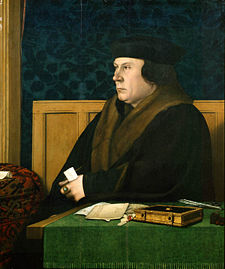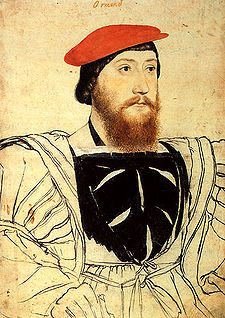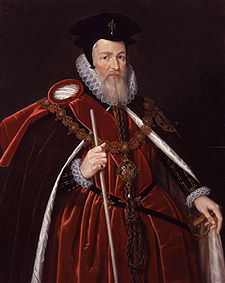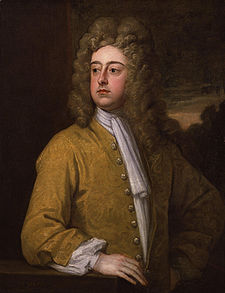- Lordsiegelbewahrer
-
Der Lordsiegelbewahrer (Lord Keeper of the Privy Seal oder kurz Lord Privy Seal) ist eines der ältesten Ämter in der englischen bzw. britischen Regierung. Ursprünglich war der Lordsiegelbewahrer für das private königliche Siegel verantwortlich.
Der Lord Privy Seal ist der fünfte unter den Great Officers of State, den Großen Regierungsbeamten. Über ihm stehen nur mehr der Lord President of the Council (Präsident des Privy Council), der Lord High Treasurer (Lordschatzmeister), der Lord High Chancellor (Lordkanzler) und ganz oben der Lord High Steward (Hofmarschall).
Der Lord Privy Seal gehört in der Geschichte Englands und des Vereinigten Königreichs zu den einflussreichsten Persönlichkeiten, denn es gab keine Amtshierarchie in der Regierung, so dass der die Politik bestimmende Minister nicht nur der First Lord of the Treasury, sondern auch der Lord Privy Seal oder der Lord President of the Council sein konnte. Noch im Jahr 1902 war Robert Arthur Talbot Gascoyne-Cecil, 3. Marquess of Salisbury, als Lordsiegelbewahrer Premierminister, während Arthur Balfour First Lord of the Treasury war.
Einige Male wurde das Amt auch in Kommission geführt, d.h. mehrere Kommissare wurden beauftragt, die Amtsgeschäfte zu führen, wodurch der Einfluss dieser Position erheblich gemindert wurde.
Heute wird der Lord Privy Seal von der Krone auf Vorschlag des Premiers besetzt. Üblicherweise übernehmen die Vorsitzenden von House of Commons oder House of Lords den Posten des Lord Privy Seal. Heute ist das Amt am ehesten dem eines Ministers ohne Geschäftsbereich vergleichbar.
Neben dem Lord Privy Seal gab es auch das Amt des Lord Keeper of the Great Seal, also den Bewahrer des Öffentlichen Siegels – ein Amt, das alternativ zu dem des Lordkanzlers verliehen wurde und ähnlich Pflichten beinhaltete. Im mittelalterlichen Frankreich war das Amt des Gardien du Sceaux meist dem Chancelier de France anvertraut.
Lords Privy Seal von England 1307–1707
- William Melton (1307–1312)
- Roger Northburgh (1312–1316)
- Thomas Charlton (1316–1320)
- Robert Baldock (1320–1323)
- Robert Wodehouse (1323)
- Robert Ayleston (1323–1324)
- William Airmyn (1324–1325)
- Henry Cliff (1325)
- William Herlaston (1325–1326)
- Robert Wyvell (1326–1327)
- Richard Airmyn (1327–1328)
- Adam Lymbergh (1328–1329)
- Richard Bury, Bischof von Durham (1329–1334)
- Robert Ayleston (1334)
- Robert Tawton (1334–1335)
- William de la Zouch (1335–1337)
- Richard Bintworth (1337–1338)
- William Kilsby (1338–1342)
- John Offord (1342–1344)
- Thomas Hatfield (1344–1345)
- John von Thoresby (1345–1347)
- Simon Islip, Erzbischof von Canterbury (1347–1350)
- Michael Northburgh (1350–1354)
- Thomas Bramber (1354–1355)
- John Winwick (1355–1360)
- John Buckingham, Bischof von Lincoln (1360–1363)
- William von Wykeham (1363–1367)
- Peter Lacy (1367–1371)
- Nicholas Carew (1371–1377)
- John Fordham (1377–1381)
- William Dighton (1381–1382)
- Walter Skirclaw, Bischof von Coventry und Lichfield (1382–1386)
- John Waltham, Bischof von Salisbury (1386–1389)
- Edmund Stafford, Bischof von Exeter (1389–1396)
- Guy Mone (1396–1397)
- Richard Clifford (1397–1401)
- Thomas Langley (1401–1405)
- Nicholas Bubwith (1405–1406)
- John Prophet (1406–1415)
- John Wakering, Bischof von Norwich (1415–1416)
- Henry Ware (1416–1418)
- John Kemp, Bischof von Rochester (1418–1421)
- John Stafford (1421–1422)
- William Alnwick, Bischof von Norwich (1422–1432)
- William Lyndwood, Bischof von St David's (1432–1443)
- Thomas Beckington, Bischof von Bath und Wells (1443–1444)
- Adam Moleyns, Bischof von Chichester (1444–1450)
- Andrew Holes (1450–1452)
- Thomas Lisieux (1452–1456)
- Laurence Booth, Bischof von Durham (1456–1460)
- Robert Stillington, Bischof von Bath und Wells (1460–1467)
- Thomas Rotheram, Bischof von Rochester (1467–1470)
- John Hales (Bischof), Bischof von Coventry und Lichfield (1470–1471)
- Thomas Rotheram, Bischof von Rochester (1471–1474)
- John Russell, Bischof von Rochester, später Bischof von Lincoln (1473–1483)
- John Gunthorp (1483–1485)
- Peter Courtenay, Bischof von Exeter (1485–1487)
- Richard Fox, Bischof von Exeter, später Bischof von Bath und Wells, Bischof von Durham und Bischof von Winchester (1487–1516)
- Thomas Ruthall, Bischof von Durham (1516–1523)
- Henry Marny, 1. Baron Marny (1523)
- Cuthbert Tunstall, Bischof von London (1523–1530)
- Thomas Boleyn, 1. Earl of Wiltshire (1530–1536)
- Thomas Cromwell, 1. Earl of Essex (1536–1540)
- William Fitzwilliam, 1. Earl of Southampton (1540–1542)
- John Russell, 1. Earl Bedford (1542–1555)
- William Paget, 1. Baron Paget (1555–1558)
- William Cecil, 1. Baron Burghley (1571–1572)
- William Howard, 1. Lord Howard of Effingham (1572–1573)
- Sir Thomas Smith (1573–1576)
- Francis Walsingham (1576–1590)
- William Cecil, 1. Baron Burghley (1590–1598)
- Robert Cecil, 1. Earl of Salisbury (1598–1608)
- Henry Howard, 1. Earl of Northampton (1608–1614)
- Robert Carr, 1. Earl of Somerset (1614–1616)
- Edward Somerset, 4. Earl of Worcester (1616–1625)
- Sir John Coke (1625–1628)
- Sir Robert Naunton (1628)
- Henry Montagu, 1. Earl of Manchester (1628–1642)
- Lucius Cary, 2. Viscount Falkland (1643)
- Sir Edward Nicholas (1643–1644)
- Henry Bourchier, 5. Earl of Bath (1644–1654)
- John Robartes, 2. Baron Robartes (1661–1673)
- Arthur Annesley, 1. Earl of Anglesey (1673–1682)
- George Saville, 1. Marquess of Halifax (1682–1685)
- Henry Hyde, 2. Earl of Clarendon (1685–1687)
- Henry Arundell, 3. Baron Arundell of Wardour (1687–1688)
- George Saville, 1. Marquess of Halifax (1689–1690)
- In Commission 1690–1692
- Thomas Herbert, 8. Earl of Pembroke (1692–1699)
- John Lowther, 1. Viscount Lonsdale (1699–1700)
- Ford Grey, 1.. Earl of Tankerville (1700–1701)
- In Commission 1701–1702
- John Sheffield, 1. Duke of Buckingham and Normanby (1702–1705)
- John Holles, 1. Duke of Newcastle-upon-Tyne (1705–1707)
Lords Privy Seal von Großbritannien 1707–1801
- John Holles, 1. Duke of Newcastle (1707–1711)
- John Robinson, Bischof von Bristol (1711–1713)
- William Legge, 1. Earl of Dartmouth (1713–1714)
- Thomas Wharton, 1. Marquess of Wharton (1714–1715)
- In Commission 1715
- Charles Spencer, 3. Earl of Sunderland (1715–1716)
- Evelyn Pierrepont, 1. Duke of Kingston (1716–1719)
- Henry Grey, 1. Duke of Kent (1719–1720)
- Evelyn Pierrepont, 1. Duke of Kingston (1720–1726)
- Thomas Trevor, 1. Baron Trevor (1726–1730)
- Spencer Compton, 1. Earl of Wilmington (1730–1731)
- In Commission 1731
- William Cavendish, 3. Duke of Devonshire (1731–1733)
- Henry Lowther, 3. Viscount Lonsdale (1733–1735)
- Francis Godolphin, 2. Earl of Godolphin (1735–1740)
- John Hervey, 2. Baron Hervey of Ickworth (1740–1742)
- John Leveson-Gower, 2. Baron Gower (1742–1743)
- George Cholmondeley, 3. Earl of Cholmondeley (1743–1744)
- John Leveson-Gower, 1. Earl Gower (1744–1755)
- Charles Spencer, 3. Duke of Marlborough (1755)
- Granville Leveson-Gower, 2. Earl Gower (1755–1757)
- Richard Grenville, 2. Earl Temple (1757–1761)
- In Commission 1761
- John Russell, 4. Duke of Bedford (1761–1763)
- George Spencer, 4. Duke of Marlborough (1763–1765)
- Thomas Pelham-Holles, 1. Duke of Newcastle-upon-Tyne, (1765–1766)
- William Pitt, 1. Earl of Chatham (1766–1768)
- George William Hervey, 5. Earl of Bristol (1768–1770)
- George Montague-Dunk, 2. Earl of Halifax (1770–1771)
- Henry Howard, 12. Earl of Suffolk (1771)
- Augustus FitzRoy, 3. Duke of Grafton (1771–1775)
- William Legge, 2. Earl of Dartmouth (1775–1782)
- Augustus FitzRoy, 3. Duke of Grafton (1782–1783)
- Frederick Howard, 5. Earl of Carlisle (1783)
- Charles Manners, 4. Duke of Rutland (1783–1784)
- In Commission 1784
- Granville Leveson-Gower, 1. Marquess of Stafford (1784–1794)
- George John Spencer, 2. Earl Spencer (1794)
- John Pitt, 2. Earl of Chatham (1794–1798)
- John Fane, 10. Earl of Westmorland (1798–1801)
Lords Privy Seal des Vereinigten Königreiches 1801-heute
- John Fane, 10. Earl of Westmorland (1801–1806)
- Henry Addington, 1. Viscount Sidmouth (1806)
- Henry Vassall-Fox, 3. Baron Holland (1806–1807)
- John Fane, 10. Earl of Westmorland (1807–1827)
- William Cavendish-Scott-Bentinck, 4. Duke of Portland (1827)
- George Howard, 6. Earl of Carlisle (1827–1828)
- Edward Law, 2. Baron Ellenborough (1828–1829)
- James St Clair-Erskine, 2. Earl of Rosslyn (1829–1830)
- John George Lambton, 1. Baron Durham (1830–1833)
- Frederick John Robinson, 1. Earl of Ripon (1833–1834)
- George Howard, 6. Earl of Carlisle (1834)
- Constantine Henry Phipps, 2. Earl of Mulgrave (1834)
- James Stuart-Wortley-Mackenzie, 1. Baron Weik (1834–1835)
- John William Ponsonby, Viscount Duncannon (1835–1840)
- George William Frederick Villiers, 4. Earl of Clarendon (1840–1841)
- Richard Temple-Nugent-Brydges-Chandos-Grenville, 2. Duke of Buckingham and Chandos (1841–1842)
- Walter Francis Montagu-Douglas-Scott, 5. Duke of Buccleuch (1842–1846)
- Thomas Hamilton, 9. Earl of Haddington (1846)
- Gilbert Elliot-Murray-Kynynmound, 2. Earl of Minto (1846–1852)
- James Brownlow William Gascoyne-Cecil, 2. Marquess of Salisbury (1852)
- George Douglas Campbell, 8. Duke of Argyll (1853–1855)
- Dudley Ryder, 2. Earl of Harrowby (1855–1858)
- Ulick John de Burgh, 1. Marquess of Clanricarde (1858)
- Charles Philip Yorke, 4. Earl of Hardwicke (1858–1859)
- George Douglas Campbell, 8. Duke of Argyll (1859–1866)
- James Howard Harris, 3. Earl of Malmesbury (1866–1868)
- John Wodehouse, 1. Earl of Kimberley (1868–1870)
- Charles Wood, 1. Viscount Halifax (1870–1874)
- James Howard Harris, 3. Earl of Malmesbury (1874–1876)
- Benjamin Disraeli, 1. Earl of Beaconsfield (1876–1878)
- Algernon George Percy, 6. Duke of Northumberland (1878–1880)
- George Douglas Campbell, 8. Duke of Argyll (1880–1881)
- Chichester Parkinson-Fortescue, 1. Baron Carlingford (1881–1885)
- Archibald Primrose, 5. Earl of Rosebery (1885)
- Dudley Ryder, 3. Earl of Harrowby (1885–1886)
- William Ewart Gladstone (1886)
- George Henry Cadogan, 5. Earl Cadogan (1886–1892)
- William Ewart Gladstone (1892–1894)
- Edward Marjoribanks, 2. Baron Tweedmouth (1894–1895)
- Richard Assheton Cross, 1. Viscount Cross (1895–1900)
- Robert Arthur Talbot Gascoyne-Cecil, 3. Marquess of Salisbury (1900–1902)
- Arthur Balfour (1902–1903)
- James Edward Hubert Gascoyne-Cecil, 4. Marquess of Salisbury (1903–1905)
- George Frederick Samuel Robinson, 1. Marquess of Ripon (1905–1908)
- Robert Crewe-Milnes, 1. Earl of Crewe (1908–1911)
- Charles Robert Wynn Carrington, 1. Earl Carrington (1911–1912)
- Robert Crewe-Milnes, 1. Marquess of Crewe (1912–1915)
- George Nathaniel Curzon, 1. Earl Curzon (1915–1916)
- David Lindsay, 27. Earl of Crawford (1916–1919)
- Andrew Bonar Law (1919–1921)
- Austen Chamberlain (1921–1922)
- Robert Cecil, 1. Viscount Cecil of Chelwood (1922–1924)
- John Robert Clynes (1924)
- James Edward Hubert Gascoyne-Cecil, 4. Marquess of Salisbury (1924–1929)
- James Henry Thomas (1929–1930)
- Vernon Hartshorn (1930–1931)
- Thomas Johnston (1931)
- William Wellesley Peel, 1. Earl Peel (1931)
- Philip Snowden, 1. Viscount Snowden (1931–1932)
- Stanley Baldwin (1932–1934)
- Anthony Eden (1934–1935)
- Charles Vane-Tempest-Stewart, 7. Marquess of Londonderry (1935)
- Edward Frederick Lindley Wood, 3. Viscount Halifax (1935–1937)
- Herbrand Sackville, 9. Earl De La Warr (1937–1938)
- Sir John Anderson (1938–1939)
- Samuel Hoare, 1. Viscount Templewood (1939–1940)
- Sir Kingsley Wood (1940)
- Clement Attlee (1940–1942)
- Sir Stafford Cripps (1942)
- Robert Arthur James Gascoyne-Cecil, Viscount Cranborne (1942–1943)
- Max Aitken, 1. Baron Beaverbrook (1943–1945)
- Arthur Greenwood (1945–1947)
- Philip Inman, 1. Baron Inman (1947)
- Christopher Addison, 1. Viscount Addison (1947–1951)
- Ernest Bevin (1951)
- Richard Stokes (1951)
- Robert Arthur James Gascoyne-Cecil, 5. Marquess of Salisbury (1951–1952
- Harry Crookshank (1952–1955)
- Rab Butler (1955–1959)
- Quintin McGarel Hogg, 2. Viscount Hailsham (1959–1960)
- Edward Heath (1960–1963)
- Selwyn Lloyd (1963–1964)
- Francis Aungier Pakenham, 7. Earl of Longford (1964–1965)
- Sir Frank Soskice (1965–1966)
- Francis Aungier Pakenham, 7. Earl of Longford (1966–1968)
- Edward Shackleton, Baron Shackleton (1968)
- Fred Peart (1968)
- Edward Shackleton, Baron Shackleton (1968–1970)
- George Jellicoe, 2. Earl Jellicoe (1970–1973)
- David Hennessy, 3. Baron Windlesham (1973–1974)
- Malcolm Shepherd, 2. Baron Shepherd (1974–1976)
- Fred Peart, Baron Peart (1976–1979)
- Sir Ian Gilmour (1979–1981)
- Humphrey Atkins (1981–1982)
- Janet Young, Baroness Young (1982–1983)
- John Biffen (1983–1987)
- John Wakeham (1987–1988)
- John Ganzoni, 2. Baron Belstead (1988–1990)
- David Waddington, Baron Waddington (1990–1992)
- John Wakeham, Baron Wakeham (1992–1994)
- Robert Gascoyne-Cecil, Viscount Cranborne (1994–1997)
- Ivor Richard, Baron Richard (1997–1998)
- Margaret Jay, Baroness Jay of Paddington (1998–2001)
- Gareth Wyn Williams, Baron Williams of Mostyn (2001–2003)
- Peter Hain (2003–2005)
- Geoff Hoon (2005–2006)
- Jack Straw (2006–2007)
- Harriet Ruth Harman (2007–2010)
- George Young (2010– )
Lord High Steward | Lord High Chancellor | Lord High Treasurer | Lord President of the Council | Lord Keeper of the Privy Seal | Lord Great Chamberlain | Lord High Constable | Earl Marshal | Lord High Admiral
Wikimedia Foundation.





